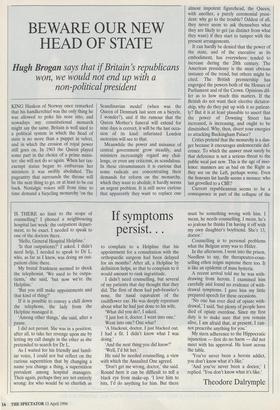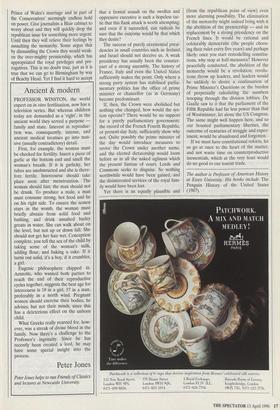BEWARE OUR NEW HEAD OF STATE
Hugh Brogan says that if Britain's republicans
won, we would not end up with a non-political president
KING Haakon of Norway once remarked that his handkerchief was the only thing he was allowed to poke his nose into, and nowadays any constitutional monarch might say the same. Britain is well used to a political system in which the head of state is no more than a puppet in velvet, and in which the erosion of royal power still goes on. In 1963 the Queen played some part in the choice of a prime minis- ter: she will not do so again. When her tax- exempt status began to embarrass her ministers it was swiftly abolished. The pageantry that surrounds the throne will be the next thing to go, or at least to be cut back. Nostalgic voices still from time to time demand a bicycling monarchy 'on the Scandinavian model' (when was the Queen of Denmark last seen on a bicycle, I wonder?), and if the rumour that the Queen Mother's funeral will extend for nine days is correct, it will be the last occa- sion of its kind: infuriated London motorists will see to that.
Meanwhile the power and nuisance of central government grow steadily, and ministers increasingly regard any chal- lenge, or even any criticism, as scandalous. In these circumstances it is curious that some radicals are concentrating their demands for reform on the monarchy, which they want to abolish; it hardly seems an urgent problem. It is still more curious that apparently they want to replace one almost impotent figurehead, the Queen, with another, a purely ceremonial presi- dent: why go to the trouble? Oddest of all, they never seem to ask themselves what they are likely to get (as distinct from what they want) if they start to tamper with the present arrangements.
It can hardly be denied that the power of the state, and of the executive as its embodiment, has everywhere tended to increase during the 20th century. The American presidency is the most obvious instance of the trend, but others might be cited. The British premiership has engorged the powers both of the Houses of Parliament and of the Crown. Opinions dif- fer as to how much this matters. If the British do not want their elective dictator- ship, why do they put up with it so patient- ly? But it is at least plausible to assert that the power of Downing Street has increased, is increasing, and ought to be diminished. Why, then, divert your energies to attacking Buckingham Palace?
Critics pretend that the monarchy is a dan- ger because it encourages undemocratic def- erence. To which the answer must surely be that deference is not a serious threat to the public weal just now. This is the age of inso- lence: manners are as bad on the Right as they are on the Left, perhaps worse. Even the honours list hardly seems a menace: who last grovelled to a CBE?
Current republicanism seems to be a consequence in part of the collapse of the Prince of Wales's marriage and in part of the Conservatives' seemingly endless hold on power. Give journalists a Blair cabinet to worry about and they will quickly drop the republican issue for something more urgent. Until then they will relieve their feelings by assaulting the monarchy. Some argue that by dismantling the Crown they would weak- en the over-mighty premiership, which has appropriated the royal privileges and pre- rogatives. This is no doubt true, just as it is true that we can go to Birmingham by way of Beachy Head. Yet I find it hard to accept that a frontal assault on the swollen and oppressive executive is such a hopeless tac- tic that this flank attack is worth attempting; and even if it succeeded, can radicals be sure that the outcome would be that which they desire?
The success of purely ceremonial presi- dencies in small countries such as Ireland and Israel should not deceive us. A weak presidency has usually been the counter- part of a strong assembly. The history of France, Italy and even the United States sufficiently makes the point. Only where a strong party system has stabilised parlia- mentary politics has the office of prime minister or chancellor (as in Germany) become predominant.
If, then, the Crown were abolished but nothing else changed, how would the sys- tem operate? There would be no support for a purely parliamentary government: the record of the French Fourth Republic, or present-day Italy, sufficiently show why not. Quite possibly the prime minister of the day would introduce measures to revive the Crown under another name, and the elected dictatorship would loom before us in all the naked ugliness which the present fustian of court, Lords and Commons seeks to disguise. So nothing worthwhile would have been gained, and the disinterested services of the royal fam- ily would have been lost.
Yet there is an equally plausible and (from the republican point of view) even more alarming possibility. The elimination of the monarchy might indeed bring with it the abolition of the premiership — and its replacement by a strong presidency on the French lines. It would be rational and colourably democratic (the people choos- ing their ruler every five years) and perhaps likely: once you start remodelling constitu- tions, why stop at half-measures? However peacefully conducted, the abolition of the monarchy would be a revolution; revolu- tions throw up leaders, and leaders would be unlikely to desire a continuation of Prime Minister's Questions or the burden of perpetually calculating the numbers trooping through the division lobbies. De Gaulle saw to it that the parliament of the Fifth Republic had far less power than that of Westminster, let alone the US Congress. The same might well happen here, and so our boasted parliamentary liberties, the outcome of centuries of struggle and exper- iment, would be abandoned and forgotten.
If we must have constitutional reform, let us go at once to the heart of the matter, and not waste time on counterproductive inessentials, which at the very least would do no good to our tourist trade.
The author is Professor of American History at Essex University. His books include The Penguin History of the United States (1987).



































































 Previous page
Previous page